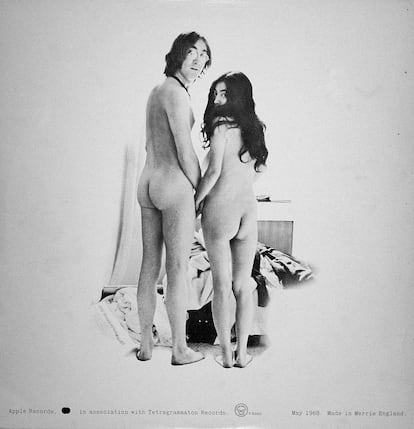Nudity as a pop weapon for the revolution
Half a century before Eva Amaral sang bare-chested, John Lennon and Yoko Ono displayed their bodies on the cover of ‘Two Virgins,’ ‘Hair’ caused a scandal and Glastonbury danced nude

In 1968, when he was still a Beatle, John Lennon and Yoko Ono released the experimental album Unfinished Music No.1: Two Virgins. It is not widely remembered for its songs (there were none of those), but because the couple hid nothing of their bodies in the photographs on the front and back covers, images they took themselves with a time-lapse camera. The record was sold wrapped in a cardboard sleeve, trimmed to reveal only their faces, and with a quote from Genesis: “And they were both naked, the man and his wife, and were not ashamed.”
The revolutions that were underway in the 1960s, launched in a far more conservative society than today’s, included nudity as a form of activism and artistic expression, of protest and self-affirmation. Those who let them themselves appear vulnerable and imperfect send a strong message about themselves and against taboos, not only that of nudity.
The musical Hair was very controversial — and successful — on its premiere in New York in 1967. The show brought together a group of hippies and a soldier on his way to Vietnam: in the middle of a powerful anti-war story, there came a (fleeting) moment when all the actors, and there were several dozen of them, appeared naked before the audience. The director, Tom O’Horgan, explained the scene as “a celebration of freedom, an abandonment of false values. Short, beautiful, and not at all erotic.” That image was not carried over to the 1979 movie version.
At the second Glastonbury festival, in 1971, when it was not the global event it is today, a good part of the British hippy community arrived naked, and that was cool because of the clothes worn by others, as described in the documentary Glastonbury Fayre, available on Netflix. One of those nudists, whose name was William Jellett, danced on stage during an improvisation with Magic Michael’s percussionists, wearing only a short sleeveless T-shirt. Other young people with no clothing at all, except perhaps a necklace or a flower in their hair, danced in the audience, spun around on motorcycles, frolicked in the grass, or took baths in muddy puddles, much like at the Woodstock festival two years earlier.
“There was nothing to suggest indecency or pornography. Everyone naked and behaving in a totally natural way. I didn’t feel uncomfortable at all,” a priest who was present says in the documentary (he was not the only one: masses were held, although Hare Krishna was more successful).

The innocence of the hippy era is a distant memory but freedoms are facing a reactionary offensive today as they were then. Spanish singer Eva Amaral revived the power of a political gesture of long-standing tradition at the Sonorama festival, singing with her torso uncovered. Like Liberty Leading the People, pained by Delacroix in 1830, or as exercised by Femen activists, one that is still banned on Facebook and Instagram. The old battles are still being fought.
Sign up for our weekly newsletter to get more English-language news coverage from EL PAÍS USA Edition
Tu suscripción se está usando en otro dispositivo
¿Quieres añadir otro usuario a tu suscripción?
Si continúas leyendo en este dispositivo, no se podrá leer en el otro.
FlechaTu suscripción se está usando en otro dispositivo y solo puedes acceder a EL PAÍS desde un dispositivo a la vez.
Si quieres compartir tu cuenta, cambia tu suscripción a la modalidad Premium, así podrás añadir otro usuario. Cada uno accederá con su propia cuenta de email, lo que os permitirá personalizar vuestra experiencia en EL PAÍS.
¿Tienes una suscripción de empresa? Accede aquí para contratar más cuentas.
En el caso de no saber quién está usando tu cuenta, te recomendamos cambiar tu contraseña aquí.
Si decides continuar compartiendo tu cuenta, este mensaje se mostrará en tu dispositivo y en el de la otra persona que está usando tu cuenta de forma indefinida, afectando a tu experiencia de lectura. Puedes consultar aquí los términos y condiciones de la suscripción digital.









































